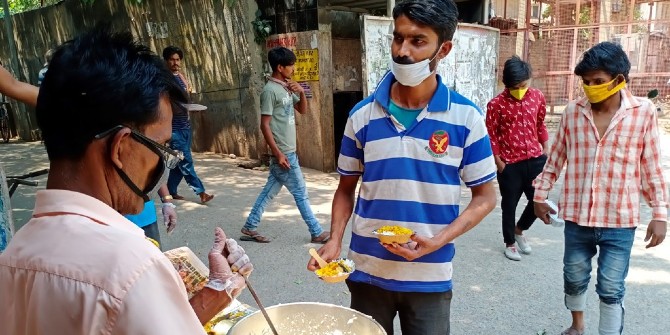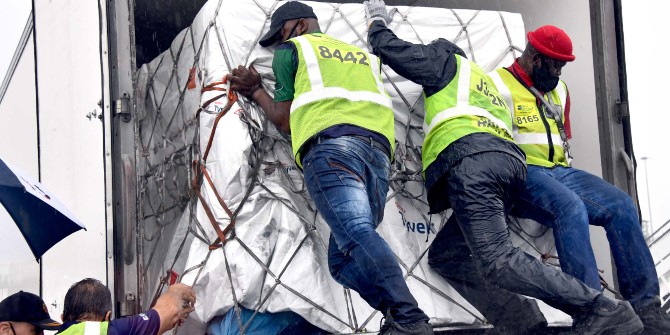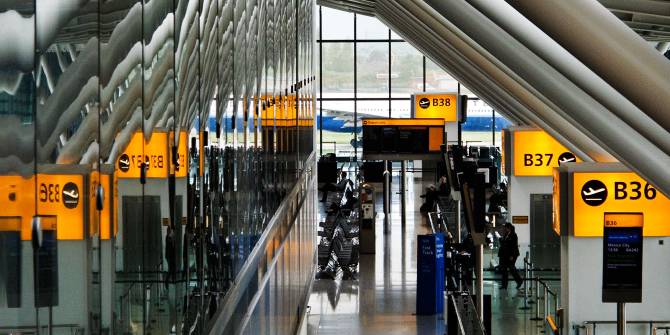Food insecurity is on the rise. Many countries are considering relaxing trade restrictions in light of the pandemic to boost economies and avoid big price rises. But what effect does a liberal trade policy actually have on people’s chances of suffering from food insecurity? Pepita Barlow and Aaron Reeves (LSE) find that in better-off countries, it helps – but this is not true in poorer nations.
While flour, pasta and other staples have returned to supermarket shelves, the problem of food insecurity goes far beyond what is available in our local shops. The spread of COVID-19 has created massive economic uncertainty and will cause millions more people to experience food insecurity as the knock-on challenges created by the pandemic reverberate around the world. A recent World Food Programme (WFP) projection indicates that, because of the economic effects and supply chain disruptions associated with COVID-19, the number of people living in food insecurity could double in 2020, to 265 million people globally.

Food insecurity has long been a key global health issue, and the current rise is taking place against a backdrop of already high and persistent food insecurity. When people have inadequate access to nutritious food, it has a profound scarring effect on their health and can result in nutritional deficiencies, malnutrition, wasting, and premature mortality. Even in contexts where these severe outcomes are rare, food insecurity is associated with a higher risk of cardiovascular disease, low mental health, and poor management of long-term health conditions.
Eradicating it is therefore a key priority in the global health and development agenda. Yet precisely how to achieve this goal remains unclear. For example, international organisations have long promoted liberal trade policy because it was often presumed to reduce hunger, but studies to date have reached divergent conclusions and often failed to consider how trade policy might affect some socio-economic groups in different ways. What is particularly challenging is identifying how the increases in food supplies and reductions in food prices that sometimes arise from liberalised trade may interact with changes to affordability and access as people lose work or their incomes stagnate.
In a recent paper published in The Lancet Global Health, we used a unique global dataset spanning approximately half a million respondents in 132 countries, between 2014 and 2017, to assess the association between liberal trade policies and the probability of reporting ‘moderate/severe’ food insecurity across household income groups. What is novel about our analysis is the way in which we capture food insecurity across multiple dimensions, enabling us to understand how different effects on supplies, prices and incomes ultimately impact on the experience of food insecurity at the individual level.
We find that the relationship between liberal trade policy and food insecurity varies markedly between countries and across the income distribution. Liberal trade policy is predominantly associated with lower food insecurity in high-income countries, but corresponds to increased food insecurity among very poor households in low-income countries.
These results corroborate previous suggestions that food insecurity is lower among most income groups in high-income countries with more liberal trade regimes. Yet contrary to many people’s expectations, we find liberal trade policy corresponds to lower food affordability and access among some of the world’s poorest households in low-income countries.
Our results suggest there is cause for both optimism and concern for policymakers, donors, international institutions, and medics worried about how to curtail rising food insecurity, including in response to the current COVID-19 pandemic. Whilst liberal trade policies may be effective in addressing such challenges in high-income countries, complementary measures may be necessary in order to ensure widespread improvements in food security under liberal trade regimes in many low-income countries. Moreover, trade policies implemented today can constrain the policy space available to governments in the future, and so trying to roll back or mitigate rapidly implemented reforms may prove challenging. Hence, our results point toward a critical and urgent need for research that evaluates the impacts of trade policy changes on food insecurity among different socio-economic groups, and explicitly considers how policymakers can ensure shared benefits.
This post represents the views of the author and not those of the COVID-19 blog, nor LSE.




